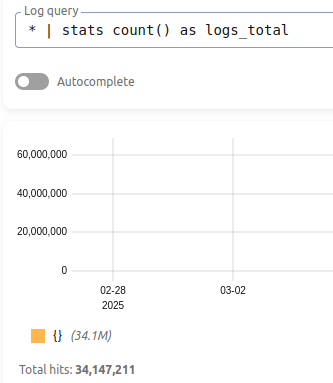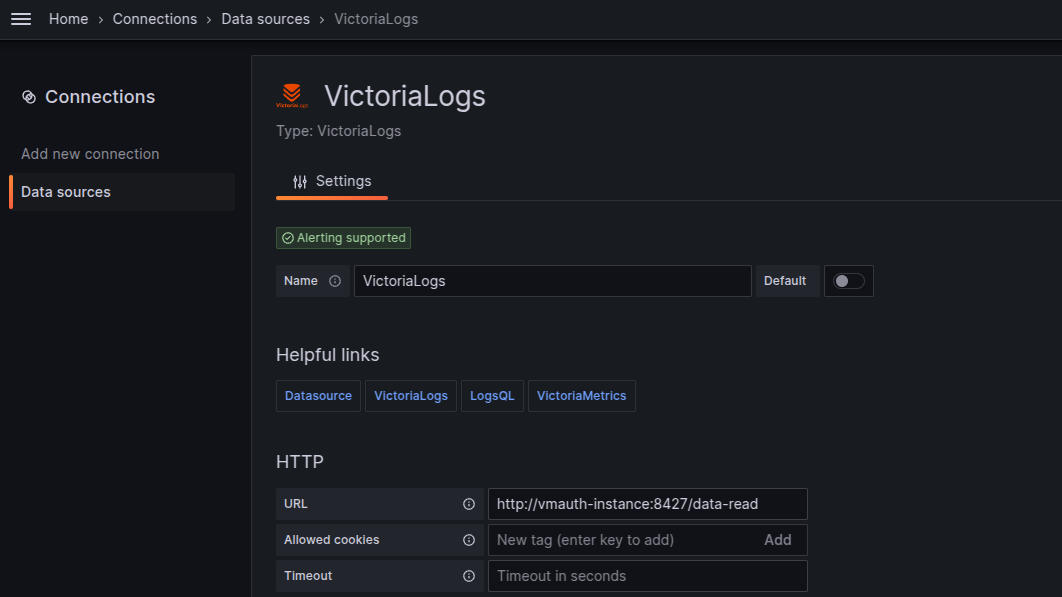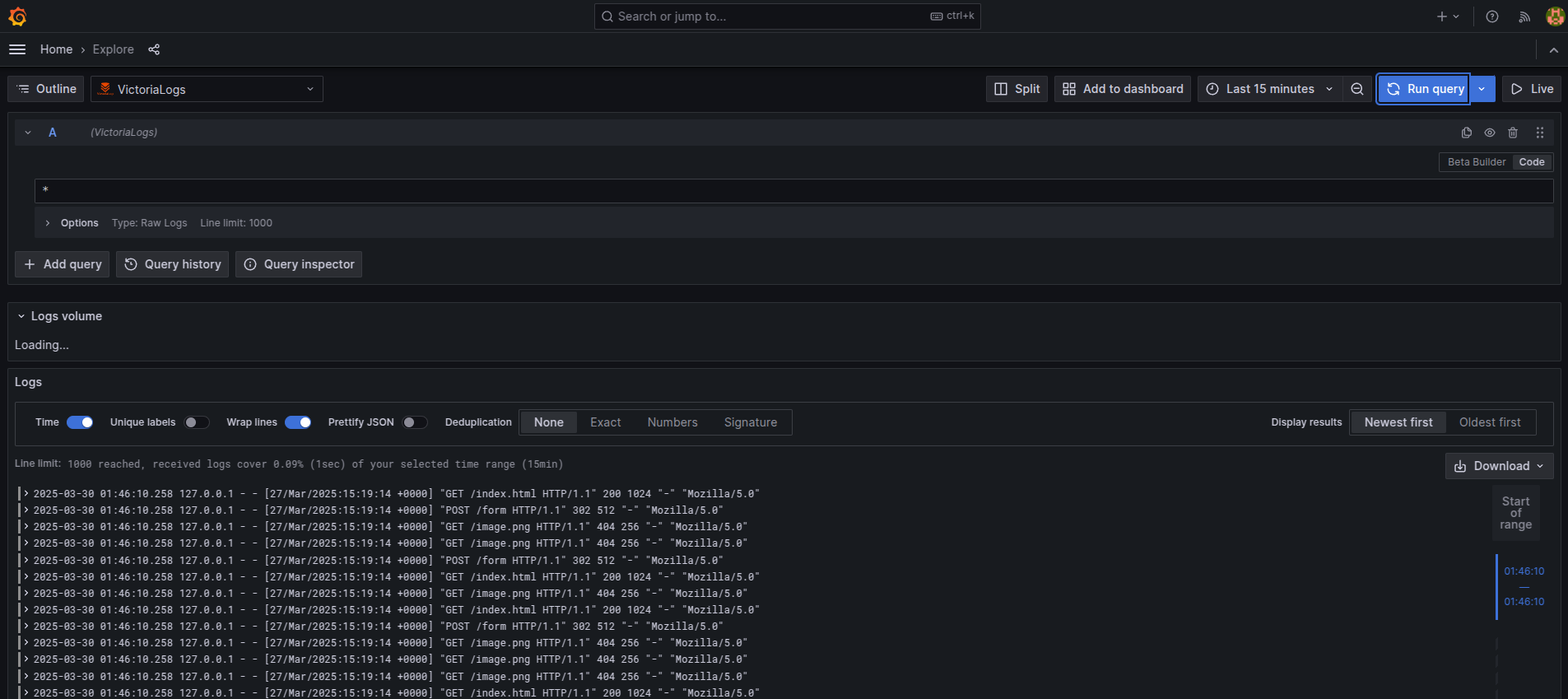VictoriaLogs: A Brief Introduction
VictoriaLogs is a high-performance log management solution from the VictoriaMetrics team. It offers significant advantages over traditional solutions like Elasticsearch:
- Storage Efficiency: Uses up to 10x less disk space
- Performance: Higher ingestion rates with lower CPU usage
- Simplicity: Single binary deployment with minimal configuration
- Query Language: Intuitive LogsQL for searching and analyzing logs
- Integration: Works seamlessly with Grafana and other monitoring tools
Designed for organizations seeking cost-effective log management without sacrificing functionality, VictoriaLogs combines performance and simplicity for modern observability needs.
Data preparation for Elasticsearch and Victoria Logs
Setup
- Elasticsearch: Assume you already have a cluster with 3 nodes!
- VictoriaLogs: docker compose for the best xD
services:
victorialogs:
image: victoriametrics/victoria-logs:v1.17.0-victorialogs
container_name: victorialogs
command:
- "--storageDataPath=/vlogs"
- "--httpListenAddr=:9428"
- "--loggerLevel=INFO"
- "--retentionPeriod=30d" # Retain logs for 30 days
volumes:
- /data/vlogs-data:/vlogs
ports:
- "9428:9428"
volumes:
vlogs-data:
Elasticsearch
- Generate nginx access logs with 3Gb size for an example via Python script
import random
import time
log_formats = [
'127.0.0.1 - - [27/Mar/2025:15:19:14 +0000] "GET /index.html HTTP/1.1" 200 1024 "-" "Mozilla/5.0"',
'127.0.0.1 - - [27/Mar/2025:15:19:14 +0000] "POST /form HTTP/1.1" 302 512 "-" "Mozilla/5.0"',
'127.0.0.1 - - [27/Mar/2025:15:19:14 +0000] "GET /image.png HTTP/1.1" 404 256 "-" "Mozilla/5.0"',
]
def generate_log_entry():
return random.choice(log_formats)
def main(filename, size_in_gb):
size_in_bytes = size_in_gb * 1024 * 1024 * 1024
with open(filename, 'w') as f:
while f.tell() < size_in_bytes:
f.write(generate_log_entry() + '\n')
if f.tell() % (1024 * 1024) == 0:
print(f"Generated {f.tell() / (1024 * 1024)} MB")
if __name__ == "__main__":
main("nginx_access.log", 3)
- Write logs to Elasticsearch (This is not the good way but okay for demo xD). And you need to create an index first.
PUT nginx_access_log
{
"settings": {
"index": {
"number_of_shards": 6,
"number_of_replicas": 1
}
}
}
import requests
import json
def parse_log_line(line):
parts = line.split(' ')
log_entry = {
"remote_host": parts[0],
"remote_user": "-",
"timestamp": parts[3].replace('[', '') + ' ' + parts[4].replace(']', ''),
"request": parts[5] + ' ' + parts[6] + ' ' + parts[7],
"status": int(parts[8]),
"bytes_sent": int(parts[9]),
"referrer": parts[10].replace('"', ''),
"user_agent": ' '.join(parts[11:]).replace('"', '')
}
return log_entry
def send_bulk_data(bulk_data, index_name):
bulk_payload = ""
for item in bulk_data:
bulk_payload += json.dumps({"index": {"_index": index_name}}) + "\n"
bulk_payload += json.dumps(item) + "\n"
response = requests.post(
'http://my-es-ip:9200/_bulk',
data=bulk_payload,
headers={'Content-Type': 'application/x-ndjson'},
auth=('elastic', 'password')
)
def main():
bulk_data = []
batch_size = 49020 # Adjust the batch size to fit 10MB bulk request
index_name = "nginx_access_log" # Set the index name
with open('nginx_access.log', 'r') as f:
for line in f:
log_entry = parse_log_line(line)
bulk_data.append(log_entry)
if len(bulk_data) >= batch_size:
send_bulk_data(bulk_data, index_name)
bulk_data = []
# Send remaining data
if bulk_data:
send_bulk_data(bulk_data, index_name)
print("Finished!")
if __name__ == "__main__":
main()
- Run script:
python nginx_to_elasticsearch.py
Victoria Logs
- Script to send:
nginx_to_victoria_logs_with_batch_size.py
import requests
import time
import json
import logging
# Set up logging
logging.basicConfig(level=logging.INFO, format='%(asctime)s - %(levelname)s - %(message)s')
def parse_log_line(line):
parts = line.split(' ')
log_entry = {
"remote_host": parts[0],
"remote_user": "-",
"timestamp": parts[3].replace('[', '') + ' ' + parts[4].replace(']', ''),
"request": parts[5] + ' ' + parts[6] + ' ' + parts[7],
"status": int(parts[8]),
"bytes_sent": int(parts[9]),
"referrer": parts[10].replace('"', ''),
"user_agent": ' '.join(parts[11:]).replace('"', ''),
"_msg": line.strip() # Include the original log line as the _msg field
}
return log_entry
def convert_to_victoria_logs(log_entry):
timestamp = int(time.mktime(time.strptime(log_entry['timestamp'], '%d/%b/%Y:%H:%M:%S %z')))
return {
"remote_host": log_entry["remote_host"],
"remote_user": log_entry["remote_user"],
"timestamp": timestamp,
"request": log_entry["request"],
"status": log_entry["status"],
"bytes_sent": log_entry["bytes_sent"],
"referrer": log_entry["referrer"],
"user_agent": log_entry["user_agent"],
"_msg": log_entry["_msg"]
}
def send_to_victoria_logs(victoria_log_entries):
try:
response = requests.post(
'http://my-vlog-ip:9428/insert/jsonline',
data='\n'.join(json.dumps(entry) for entry in victoria_log_entries),
headers={'Content-Type': 'application/json'}
)
response.raise_for_status() # Raise an exception for HTTP errors
return True
except requests.exceptions.RequestException as e:
logging.error(f"Error sending log entries: {e}")
return False
def main():
success_count = 0
error_count = 0
batch_size = 10000 # Default batch size
batch = []
with open('nginx_access.log', 'r') as f:
for line in f:
log_entry = parse_log_line(line)
victoria_log_entry = convert_to_victoria_logs(log_entry)
batch.append(victoria_log_entry)
if len(batch) >= batch_size:
if send_to_victoria_logs(batch):
success_count += len(batch)
logging.info(f"Successfully sent {len(batch)} log entries.")
else:
error_count += len(batch)
batch = []
# Send remaining log entries
if batch:
if send_to_victoria_logs(batch):
success_count += len(batch)
logging.info(f"Successfully sent {len(batch)} log entries.")
else:
error_count += len(batch)
logging.info(f"Total successfully sent logs: {success_count}")
logging.info(f"Total failed logs: {error_count}")
if __name__ == "__main__":
main()
Comparison
Elasticsearch disk Usage:
- Query:
GET _cat/indices/nginx_access_log?s=index&v - Output:
index docs.count store.size pri.store.size
nginx_access_log 34147211 1.7gb 887mb
VictoriaLogs disk Usage:
- Count total documents:
* | stats count() as logs_total

- I used the exporter built-in and displayed it with this dashboard

Compare
I see my test is not optimized, it can be optimized more to save more space for logging, i guess?
- Elasticsearch: 887Mb
- VictoriaLogs: 137Mb
So for this quick test, the VictoriaLogs use space to store logs less than ~6.5 times that of Elasticsearch.
In another test that is not created by me, but the result here xD
| Name | VictoriaLogs | Elasticsearch |
|---|---|---|
| Servers | 1 | 13 (3 master + 10 data) |
| CPU | 16 | 32 (x 13 servers) |
| RAM | 16 | 32 (x 13 servers) |
| Disk | ~120GB/day | ~1.1 TB/day |
| Log shipper | Vector: 3 instances (x 4 cores) | Filebeat: 10 instances (x 4 cores) |
After this test, you can see how much resource we save from replacing Elasticsearch with VictoriaLogs!
Cluster Mode
To be honest, VictoriaLogs did great work for a single node, which can handle everything we need. But you can think like me, where is the cluster mode, how can we failover if the single node is dead? So to answer that question. Simply, we will use: 2x VictoriaLogs + vmauth.
- So what is vmauth? It is a tool of VictoriaMetrics, used as a proxy and to manage connection to instance backends like VictoriaLogs, it added basic auth, routes the request based on URL, and supports load balancing, is easy to run and configure. Below is an example with Docker Compose:
services:
vmauth:
image: victoriametrics/vmauth:latest
container_name: vmauth
ports:
- "8427:8427"
volumes:
- ./vmauth-config.yml:/etc/vmauth-config.yml
command:
- "-auth.config=/etc/vmauth-config.yml"
- "-httpListenAddr=:8427"
restart: unless-stopped
networks:
- vmauth-network
networks:
vmauth-network:
driver: bridge
and config file vmauth-config.yml
unauthorized_user:
url_map:
- src_paths: ["/data-read/.*"]
drop_src_path_prefix_parts: 1
url_prefix:
- http://victorialogs-1:9428
- http://victorialogs-2:9428
- Then we can use that to configure as an endpoint of the VictoriaLogs datasource in Grafana

- Then query logs in Grafana datasource explorer(This is a demo), although we still have to add a dashboard like this and make a few modifications to query and filter for search log in production

- How about scale? Simply add more disk to VictoriaLogs. I assumed you used LVM for the beginning (You should calculate how much log VictoriaLogs will store).
- An example: you can use 3 disks that combined with LVM and resize or add more disks to increase the storage of VictoriaLogs.
My opinions
- VictoriaLogs used less disk space than Elasticsearch, which could be up to 10x in some specific scenarios.
- VictoriaLogs inserts data faster and uses less CPU than Elasticsearch.
- VictoriaLogs simple read is faster than Elasticsearch, but when it comes to queries with AGG, Elasticsearch wins ( with 13 nodes of cluster vs single node of VictoriaLogs xD)
- And many other things i don't know yet at this time when I'm writing this article.
- In my company, we have used 4 VictoriaLogs instances with 1 vmauth, 2 instances for 10 K8S cluster logging and 2 instances for Kong - APIGateway with an average request of about 20k -> 80k RPS and it has been tested for 3 months before we dropped Elasticsearch.
- Good for logging solution where user need a place to check logs of their container in K8S environment with multiple clusters.
- Right now, VictoriaLogs doesn't have the cluster mode, but there is a solution for it is add 1 one more instance and distribute them with the vmauth utility.
Ref:
- https://docs.victoriametrics.com/victorialogs/
- https://news.ycombinator.com/item?id=42859016
- https://itnext.io/how-do-open-source-solutions-for-logs-work-elasticsearch-loki-and-victorialogs-9f7097ecbc2f
- https://www.influxdata.com/comparison/elasticsearch-vs-victoria/